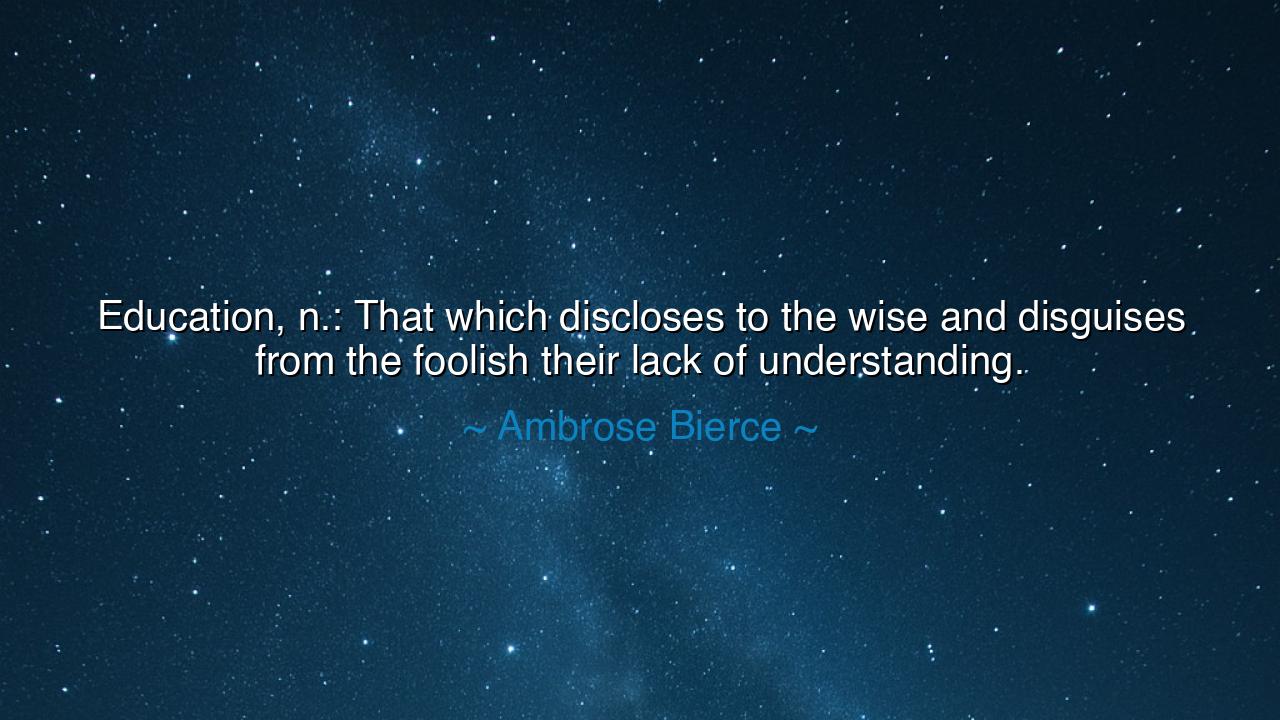
Education, n.: That which discloses to the wise and disguises
Education, n.: That which discloses to the wise and disguises from the foolish their lack of understanding.






In the piercing and sardonic words of Ambrose Bierce, “Education, n.: That which discloses to the wise and disguises from the foolish their lack of understanding.” This definition, taken from his famous Devil’s Dictionary, may sound like jest, yet within it lies a profound truth about the double-edged nature of education. Bierce, ever the cynic and philosopher, saw through the pretenses of men. He understood that knowledge, though a lamp to the wise, can also be a veil to the foolish — that true understanding is not found in learning alone, but in humility. The wise, when educated, see more clearly their ignorance; the foolish, when taught, believe they have nothing left to learn. Thus, education becomes a mirror — revealing wisdom to one, illusion to the other.
The origin of this quote can be traced to the late 19th century, when Bierce penned his satirical dictionary — a work meant not merely to amuse, but to awaken. He lived in an age that worshipped progress and intellect, yet he saw how many wore their learning like a mask, mistaking words for wisdom and facts for truth. Through this sharp definition of education, he sought to expose that human vanity which often hides beneath the robes of scholarship. Bierce’s words still echo with relevance, for even in our own time, knowledge has multiplied a thousandfold, yet true understanding remains rare. The more we know, the easier it becomes to mistake information for insight — and to forget that education is meant to enlighten, not to inflate.
To the wise, Bierce tells us, education is a revelation. It shows them the vastness of what they do not yet comprehend. The more they learn, the more they realize how infinite truth truly is. This humility — this awe before the unknown — is the beginning of real wisdom. Socrates, that greatest of teachers, once said, “I know that I know nothing.” That confession was not despair but enlightenment. Through his endless questioning, he saw that each new answer uncovered deeper mysteries. To be educated, in the truest sense, is to be humbled by the immensity of knowledge — to stand before it not with pride, but with reverence.
But to the foolish, education is but a garment for their vanity. It gives them the illusion of wisdom, not its substance. They mistake eloquence for insight, memorization for mastery. Like a child who, holding a sword, believes himself a warrior, the fool armed with facts believes himself wise. History is filled with such figures — men who used knowledge not to seek truth but to serve pride. Consider the courts of Renaissance Europe, where scholars were often valued not for their discoveries, but for their wit and flattery. They dazzled with rhetoric, yet sought no deeper wisdom. Their education disguised their ignorance as elegance — a bright cloak over an empty soul.
In contrast, look to Leonardo da Vinci, the true child of wisdom. Though a man of immense genius, he never ceased to wonder. He filled page upon page with questions — about flight, water, anatomy, and stars. He confessed, even in his old age, that he was but “a pupil of experience.” His education did not disguise his ignorance; it revealed it — and in that revelation lay his greatness. For knowledge, rightly held, is never a conclusion but a doorway. The wise pass through it to seek truth; the foolish stop at its threshold and call themselves enlightened.
Ambrose Bierce’s words, though steeped in irony, carry a moral weight. They remind us that the danger of education lies not in ignorance, but in arrogance. Learning, when divorced from humility, becomes deception. The world does not suffer from a lack of the educated; it suffers from a lack of the enlightened — those who know that knowing is endless. Bierce’s wisdom asks us to beware the comfort of certainty, for it is there that the mind begins to decay. To be truly educated is to live in constant wonder, to embrace curiosity as both gift and duty.
The lesson, dear listener, is clear and eternal: seek education, but never mistake it for understanding. Let learning be your lantern, not your crown. Approach knowledge not as a master, but as a pilgrim. When you learn something new, ask yourself not, “What do I know now?” but, “What does this reveal that I still do not?” The wise use knowledge to expand their vision; the foolish use it to narrow it. Choose to be among the wise — those who learn not to boast, but to serve; not to seem intelligent, but to become compassionate and aware.
So let the words of Ambrose Bierce live on as a gentle warning and a powerful call: Education discloses to the wise and disguises from the foolish their lack of understanding. Remember this always — that the purpose of learning is not to seem more than others, but to see more clearly oneself. For the one who learns with humility becomes a light to the world; the one who learns with pride becomes only a shadow among men. True education begins not in the classroom, but in the heart — in the courage to admit that wisdom is endless, and that the wise will forever be its students.






AAdministratorAdministrator
Welcome, honored guests. Please leave a comment, we will respond soon